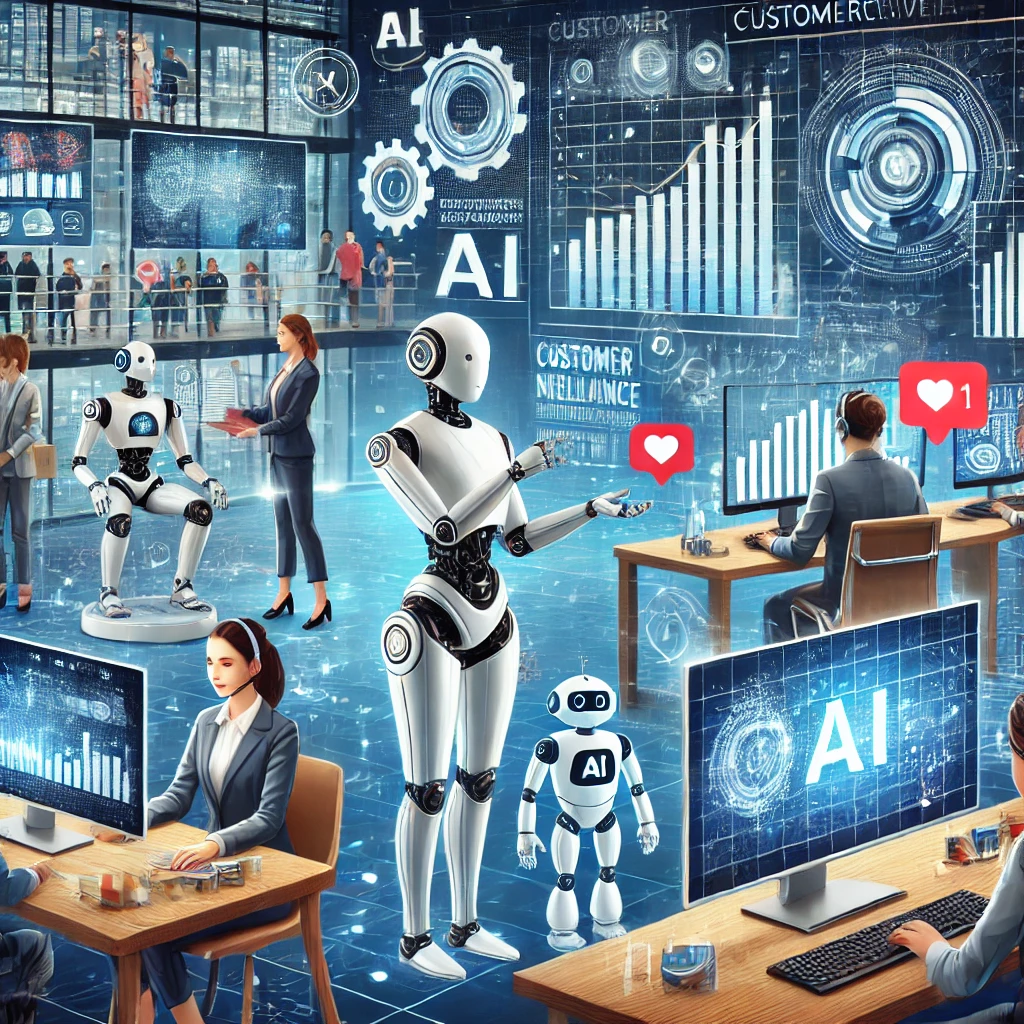Introduction
Artificial Intelligence (AI) is no longer just a futuristic concept. It has become a vital part of modern business operations, transforming how companies interact with customers, streamline processes, and make data-driven decisions. With AI technologies advancing at an unprecedented pace, businesses of all sizes are embracing these tools to improve efficiency and enhance customer experiences. This article explores how AI is revolutionizing customer service and operations, providing practical examples and insights for companies looking to harness its potential.
AI in Customer Service: Enhancing User Experience
Chatbots and Virtual Assistants
One of the most visible applications of AI in customer service is the use of chatbots and virtual assistants. These tools handle a wide range of tasks, from answering frequently asked questions to processing orders and troubleshooting issues. Companies like Amazon, with its Alexa device, and banks with virtual agents, have set new standards for immediate customer support.
AI-driven chatbots operate 24/7, ensuring customers receive assistance at any time. These bots learn from interactions, improving their responses over time. This leads to faster resolution times and improved customer satisfaction. Moreover, virtual assistants can handle multiple inquiries simultaneously, something human agents cannot achieve.
Personalized Customer Experiences
AI enables businesses to offer tailored experiences based on customer behavior and preferences. By analyzing data such as purchase history, browsing patterns, and previous interactions, companies can deliver personalized product recommendations and targeted promotions. Streaming services like Netflix and e-commerce platforms like Amazon utilize AI algorithms to suggest content and products, significantly enhancing user engagement.
Sentiment Analysis and Feedback Management
Understanding customer sentiment is crucial for improving products and services. AI-powered tools analyze customer feedback across various platforms, including social media, emails, and online reviews. These systems detect positive or negative sentiments, allowing businesses to respond promptly to concerns and capitalize on positive feedback. This real-time analysis helps companies maintain a positive brand image and build stronger customer relationships.
AI in Business Operations: Driving Efficiency and Innovation
Process Automation
AI-driven automation is streamlining various operational processes, reducing manual workloads, and minimizing errors. Robotic Process Automation (RPA) tools handle repetitive tasks like data entry, invoice processing, and inventory management. By automating these processes, businesses can allocate human resources to more strategic and creative tasks, increasing overall productivity.
Supply Chain Optimization
Managing a complex supply chain can be challenging, but AI is making it more efficient. AI-powered tools predict demand, track shipments, and identify potential disruptions. For instance, companies use machine learning algorithms to forecast product demand, ensuring optimal inventory levels and reducing stockouts or overstock situations. This leads to cost savings and improved customer satisfaction through timely deliveries.
Predictive Maintenance
In industries that rely on machinery and equipment, unexpected downtime can be costly. AI solutions monitor equipment in real-time, predicting when maintenance is needed before a breakdown occurs. This proactive approach minimizes downtime, extends equipment lifespan, and reduces maintenance costs. Manufacturing giants like General Electric and Siemens have successfully implemented AI-based predictive maintenance systems, enhancing operational efficiency.
Challenges and Considerations
While the benefits of AI in business are substantial, there are challenges to consider. Data privacy and security remain significant concerns as companies collect and analyze vast amounts of customer data. Ensuring compliance with regulations like the General Data Protection Regulation (GDPR) is essential to maintain customer trust.
Additionally, the implementation of AI requires significant investment and a skilled workforce capable of managing these technologies. Businesses must provide adequate training to employees to work alongside AI tools effectively.
The Future of AI in Business
As AI technology continues to evolve, its impact on business will only grow. Future developments may include more advanced natural language processing, enhanced predictive analytics, and increased integration with Internet of Things (IoT) devices. Companies that stay ahead of these trends and invest in AI innovations will gain a competitive edge, offering superior customer experiences and operational excellence.
Key Takeaways
- AI in customer service: Chatbots, virtual assistants, and personalized experiences enhance customer engagement and satisfaction.
- Operational efficiency: AI-driven automation and predictive maintenance improve productivity and reduce costs.
- Data analysis: AI tools offer valuable insights through sentiment analysis and demand forecasting.
- Challenges: Data privacy, security, and implementation costs must be addressed.
- Future outlook: Continued AI advancements promise even greater benefits for businesses that adapt and innovate.
Conclusion
Artificial Intelligence is revolutionizing the way businesses operate and serve their customers. From enhancing customer support with chatbots to optimizing supply chains and predicting maintenance needs, AI offers a wide range of solutions that drive efficiency and improve user experiences. While challenges like data privacy and implementation costs exist, the potential rewards make investing in AI a worthwhile endeavor for forward-thinking businesses. As AI technology continues to evolve, staying informed and proactive will be key to harnessing its full potential and maintaining a competitive edge in today’s fast-paced market.



